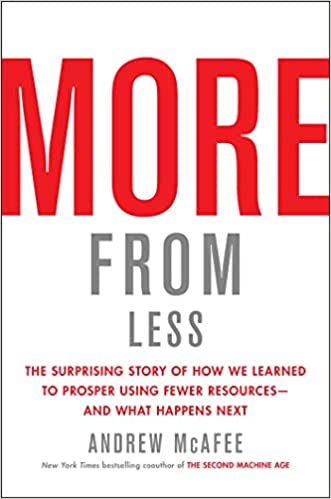You have /5 articles left.
Sign up for a free account or log in.
 More from Less: The Surprising Story of How We Learned to Prosper Using Fewer Resources―and What Happens Next by Andrew McAfee
More from Less: The Surprising Story of How We Learned to Prosper Using Fewer Resources―and What Happens Next by Andrew McAfee
Published in October of 2019.
Will COVID-19 radically accelerate the dematerialization of higher education?
That is the question that framed my reading of Andrew McAfee's book More from Less. The book chronicles how the US economy is both growing and consuming fewer resources. In the decade before the pandemic, the US GDP grew by about 15 percent, while the use of every natural resource (from aluminum to oil to zinc) declined. Of the seventy-two resources tracked by the US Geological Survey, only six have not yet reached peak consumption. Due to gains in efficiency or substitution, the production and use of every other natural resource are post-peak.
Underlying the trend of lower material consumption combined with economic growth, is the digitization of goods and services. A smartphone replaces a camcorder, SLR, radio, calculator, voice recorder, GPS, scanner, alarm clock, and much else. Computer monitors and TVs have evolved from large boxes to flat panel screens. We no longer need to make space for stacks of VHS tapes or CDs, as movies and music are now digital and streaming.
McAfee sees dematerialization as a positive. The less natural resources we use, the fewer negative impacts that economic activity has on the economy. Less oil use means lower carbon emissions and other pollutants. Declining demand for paper means more trees and forests. Diminished demand for coal and other minerals equates to less mining.
If More from Less was written during COVID-19, I wonder, would McAfee still frame dematerialization so positively?
One way to look at the COVID-19 necessitated pivot from residential to remote learning would be as a More from Less story. The catalyst for the virtualization of higher education may have been a global pandemic, but the result is a shift from the physical to the digital.
What we have learned by living through the digitization of higher education is that higher education should not be digitized.
Perhaps we didn't quite understand how valuable the physical campus experience was until we could no longer come together on campus. (Mind you, my job title at my institution is director of online programs and strategy).
As with almost every other nonfiction book released in 2020 (including my own co-written book), it is unfair to read and review the work through COVID-19 eyes.
McAfee, one of my favorite thinkers and writers, did not write a book to defend the economy's digitization. His goal was to point out that economic growth and environmental damage no longer need go hand-in-hand. He looked at the data and saw both environmental progress and economic growth. More from Less is an effort to explain this story.
For McAfee, the reason that countries can grow economically while also becoming greener can be attributed to the following four areas: technology, capitalism, public awareness, and responsive government - the Four Horsemen of the Optimist.
McAfee has lots to say about inequality, government policy, and automation. If you are depressed about your kids (or grandkids) future, then reading More for Less will cheer you up.
However, most of my big thinking energy is absorbed by thinking about the post-COVID-19 future of higher education. Reading More from Less is an inadvertently convincing argument that the postsecondary ecosystem could undergo a virtualization and digitization process.
The economic logic that undergirded physical campuses may be unwinding, at least for a sizable portion of relatively high-cost/low-wealth residential institutions.
For many college students (like my kids), the move from a higher education resting on a platform of atoms to one mediated by a sea of bits has not been a positive development. Instead of more for less, higher education without the physical campus is less for less.
What are you reading?




